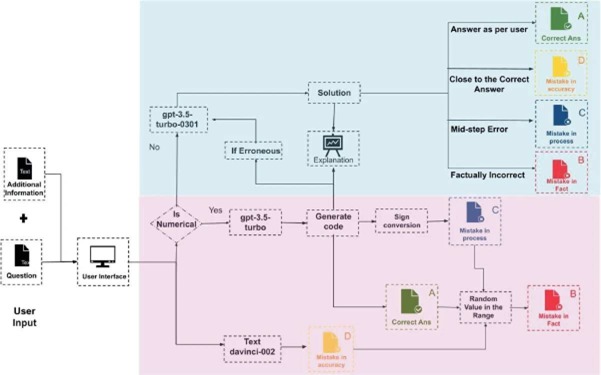This invention discloses methods and systems for generating Multiple Choice Questions (MCQs) across subject domains, wherein the responses to the MCQs can be analyzed for determining learner deficiency. Embodiments herein disclose methods and systems for generating distractors for Multiple Choice Questions (MCQs) across subject domains, wherein the distractors for fact (fundamental information related to the answer to the question), process (concepts and application methods required to solve the problem), and accuracy (degree of closeness of the answer to its true value) are generated.
Traditional multiple-choice question (MCQ) systems often fail to effectively assess the underlying learning deficiencies in students. Most MCQ generators focus only on distractor generation without ensuring those distractors reflect specific cognitive or conceptual errors. There is a lack of automated, intelligent systems that can analyze a question and generate meaningful distractors-such as accuracy, process, and factual distractors – to pinpoint specific learning gaps in learners.
- Automated MCQ Generation Using GPT with Reinforcement Learning: The system leverages a GPT architecture trained with Reinforcement Learning (RL) to generate not only correct answers but also intelligent distractors, ensuring high-quality, adaptive question creation.
- Categorized Distractors for Diagnostic Precision: Unlike traditional systems, this solution generates three distinct types of distractors-accuracy, process, and factual-allowing educators to identify the exact nature of a learner's misunderstanding.
- Dynamic Handling of Question Types: The system can intelligently differentiate between numerical and non-numerical questions and adjust the logic and models accordingly to generate context-appropriate MCQs.
- User-Driven Input Interface: It offers a flexible input interface where users can provide question stems, types, and correct answers, making the system adaptable across subjects and domains.
- Jumbled Option Sequencing for Assessment Integrity: The control module is configured to randomize the order of the correct answer and distractors, minimizing response bias and enhancing test fairness.
- String Manipulation and Value Tuning for Realistic Distractors: The distractors are generated by modifying strings or tuning values near the correct answer, ensuring the distractors are plausible and not trivially dismissible, which strengthens assessment reliability.
The prototype consists of a system architecture that includes a Control Module responsible for analyzing input questions and generating multiple-choice questions (MCQs). It features an Input Interface through which users can provide question stems, question types (numerical or non-numerical), and correct responses. At its core, the system uses a GPT-based engine trained with Reinforcement Learning to generate both the correct response and three distinct distractors-accuracy, process, and factual distractors. The output is a well-structured MCQ with intelligently designed options. The system employs separate processing logic for numerical and non-numerical questions, ensuring that distractors are contextually and cognitively aligned with the type and content of each question.
The technology is ready for licensing.
5
The societal impact of this technology lies in enhancing education by identifying and addressing learning deficiencies through automated, targeted MCQ generation. It helps educators detect specific misconceptions-factual, process-based, or accuracy-related-enabling focused remediation. This supports adaptive learning, reduces manual effort for teachers, and promotes equitable, data-driven educational outcomes across diverse learner groups.
- EdTech Platforms (e.g., BYJU'S, Khan Academy, Coursera)
- Schools, Colleges, and Universities
- Standardized Testing and Certification Bodies
- Corporate Learning and Skill Assessment
- AI-Driven Learning Analytics Systems
- Curriculum Development Tools
Geography of IP
Type of IP
202321042768
543855

